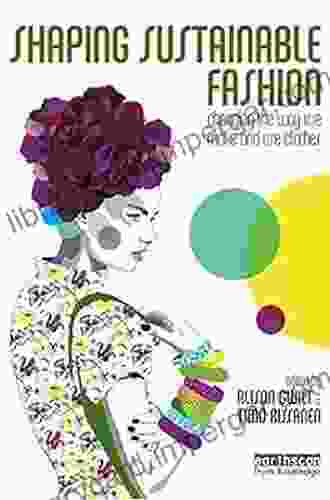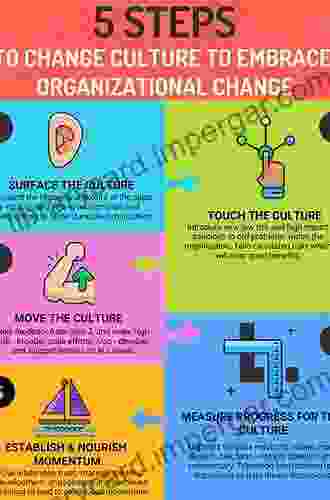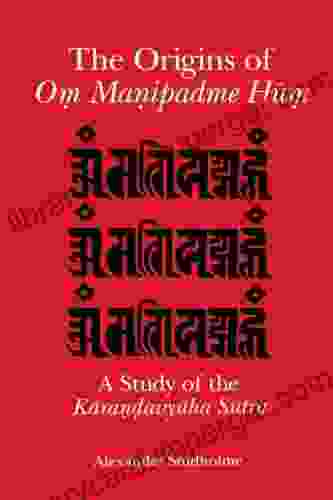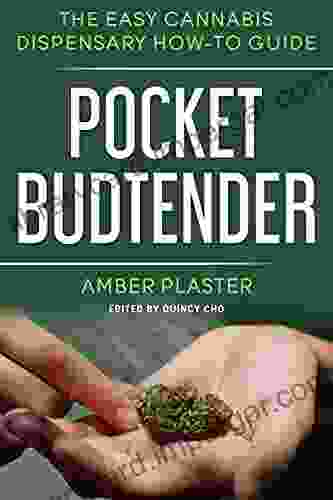Changing The Way We Make And Use Clothes: A New Era of Sustainable Fashion

The fashion industry is one of the most polluting industries in the world. It is responsible for 10% of global greenhouse gas emissions, 20% of wastewater, and 25% of all pesticides used in agriculture. The production of textiles also requires a significant amount of energy and water, and it often involves the use of harmful chemicals.
4.2 out of 5
| Language | : | English |
| File size | : | 22243 KB |
| Text-to-Speech | : | Enabled |
| Enhanced typesetting | : | Enabled |
| Word Wise | : | Enabled |
| Print length | : | 192 pages |
| Screen Reader | : | Supported |
But what if there was a way to make clothes that were both stylish and sustainable? "Changing The Way We Make And Use Clothes" explores the latest innovations in sustainable fashion, from new materials to ethical production methods. This book is a must-read for anyone who wants to make a difference in the fashion industry.
New Materials for Sustainable Fashion
One of the most important challenges in sustainable fashion is finding new materials that are both environmentally friendly and durable. Traditional materials like cotton and polyester have a significant environmental footprint, but there are now a number of new materials that offer a more sustainable alternative.
Some of the most promising new materials for sustainable fashion include:
- Hemp: Hemp is a natural fiber that is both strong and durable. It is also one of the most sustainable crops in the world, requiring less water and pesticides than cotton.
- Organic cotton: Organic cotton is grown without the use of pesticides or herbicides. It is a more sustainable alternative to traditional cotton, but it is also more expensive.
- Recycled polyester: Recycled polyester is made from recycled plastic bottles. It is a more sustainable alternative to traditional polyester, but it can be less breathable.
- Tencel: Tencel is a man-made fiber made from wood pulp. It is a more sustainable alternative to rayon, but it can be more expensive.
Ethical Production Methods for Sustainable Fashion
In addition to using sustainable materials, it is also important to use ethical production methods. This means ensuring that workers are paid a fair wage, that they work in safe conditions, and that they are not exploited.
Some of the most important ethical production methods for sustainable fashion include:
- Fair trade: Fair trade is a system of certification that ensures that farmers and workers are paid a fair price for their products. It also ensures that workers are working in safe conditions and that they are not exploited.
- GOTS: GOTS (Global Organic Textile Standard) is a certification that ensures that textiles are made from organic fibers and that they are produced in a sustainable and ethical way.
- OEKO-TEX: OEKO-TEX is a certification that ensures that textiles are free from harmful chemicals.
The Future of Sustainable Fashion
The sustainable fashion movement is still in its early stages, but it is growing rapidly. More and more consumers are becoming aware of the environmental and social costs of traditional fashion, and they are demanding more sustainable options. This is creating a huge opportunity for brands that are willing to invest in sustainable fashion.
The future of sustainable fashion looks bright. There are a number of new materials and production methods that are making it possible to create stylish and sustainable clothes. And consumers are increasingly demanding more sustainable options. This is creating a huge opportunity for brands that are willing to invest in sustainable fashion.
"Changing The Way We Make And Use Clothes" is a must-read for anyone who wants to make a difference in the fashion industry. This book explores the latest innovations in sustainable fashion, from new materials to ethical production methods. It is a valuable resource for anyone who wants to learn more about sustainable fashion and how to make a difference.
4.2 out of 5
| Language | : | English |
| File size | : | 22243 KB |
| Text-to-Speech | : | Enabled |
| Enhanced typesetting | : | Enabled |
| Word Wise | : | Enabled |
| Print length | : | 192 pages |
| Screen Reader | : | Supported |
Do you want to contribute by writing guest posts on this blog?
Please contact us and send us a resume of previous articles that you have written.
 Book
Book Novel
Novel Page
Page Chapter
Chapter Text
Text Story
Story Genre
Genre Reader
Reader Library
Library Paperback
Paperback E-book
E-book Magazine
Magazine Newspaper
Newspaper Paragraph
Paragraph Sentence
Sentence Bookmark
Bookmark Shelf
Shelf Glossary
Glossary Bibliography
Bibliography Foreword
Foreword Preface
Preface Synopsis
Synopsis Annotation
Annotation Footnote
Footnote Manuscript
Manuscript Scroll
Scroll Codex
Codex Tome
Tome Bestseller
Bestseller Classics
Classics Library card
Library card Narrative
Narrative Biography
Biography Autobiography
Autobiography Memoir
Memoir Reference
Reference Encyclopedia
Encyclopedia Alex Lluch
Alex Lluch Robert Epstein
Robert Epstein Roberta Brandes Gratz
Roberta Brandes Gratz Richard Hoffman
Richard Hoffman Vincent P O Hara
Vincent P O Hara Ellen Shoshkes
Ellen Shoshkes Judith Mcloughlin
Judith Mcloughlin Alexander Calder
Alexander Calder Amanda Owen
Amanda Owen Alexis Young
Alexis Young Michael Pendlebury
Michael Pendlebury Alice Williams
Alice Williams Alexander Mladenov
Alexander Mladenov Andrew J Finn
Andrew J Finn Alice Echols
Alice Echols Allen Appel
Allen Appel Robert R Desjarlais
Robert R Desjarlais Alice Morse Earle
Alice Morse Earle Alvin B Kernan
Alvin B Kernan Alex Keuroghlian
Alex Keuroghlian
Light bulbAdvertise smarter! Our strategic ad space ensures maximum exposure. Reserve your spot today!
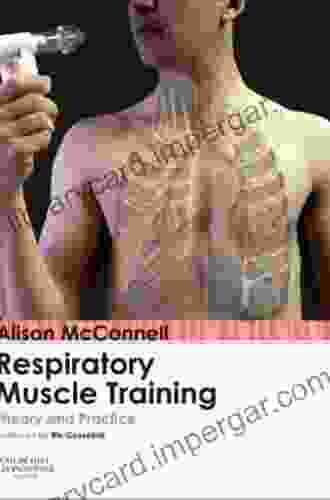
 Neil ParkerRespiratory Muscle Training: Theory and Practice: Unleash the Power of Your...
Neil ParkerRespiratory Muscle Training: Theory and Practice: Unleash the Power of Your... Brent FosterFollow ·3.4k
Brent FosterFollow ·3.4k Jim CoxFollow ·19.4k
Jim CoxFollow ·19.4k Victor HugoFollow ·17k
Victor HugoFollow ·17k Boris PasternakFollow ·17.7k
Boris PasternakFollow ·17.7k Mark TwainFollow ·13.4k
Mark TwainFollow ·13.4k Guy PowellFollow ·14.8k
Guy PowellFollow ·14.8k Jack ButlerFollow ·14.4k
Jack ButlerFollow ·14.4k Leon FosterFollow ·16.9k
Leon FosterFollow ·16.9k
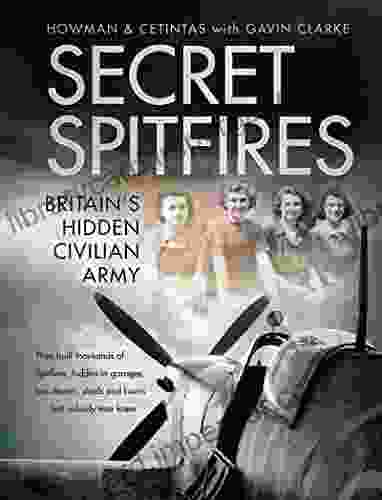
 Ignacio Hayes
Ignacio HayesUnveiling the Secret Spitfires: Britain's Hidden Civilian...
: The Untold Story of Britain's...

 Scott Parker
Scott ParkerLiving With Schizophrenia: A Father and Son's Journey
Schizophrenia is a serious...

 Ted Simmons
Ted Simmons"From Sign Up to Pass Out": The Shocking and Immersive...
Step into the...

 John Keats
John KeatsThe Development of Biographies and Philosophical...
The Alluring...

 Dan Brown
Dan BrownCapture Your Dream Wedding with Digital Wedding...
Your wedding day is...
4.2 out of 5
| Language | : | English |
| File size | : | 22243 KB |
| Text-to-Speech | : | Enabled |
| Enhanced typesetting | : | Enabled |
| Word Wise | : | Enabled |
| Print length | : | 192 pages |
| Screen Reader | : | Supported |


